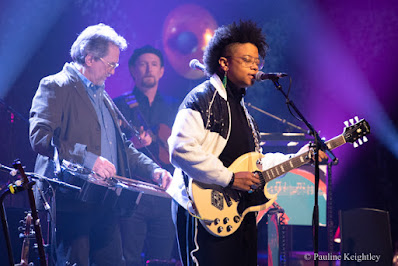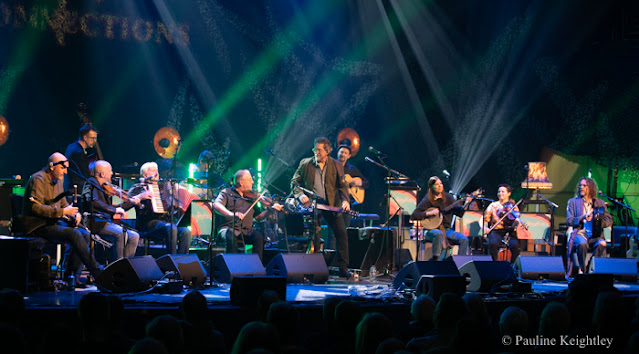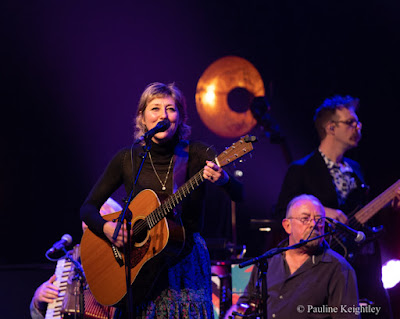The Transatlantic Sessions 2023 celebrated its 20th year with its familiar and successful format – like a warm comfort blanket – which is one of the highlights of cc festivals final weekend. Afterwards the TS goes on tour to six UK venues. The strength of the sessions concerts is the unique quality of the folk, roots band that is fronted by a range of talented solo performers. They set the stage as a relaxed living room to capture that live folk essence.
This year’s sessions hosted its eclectic and diverse line up with firstly - Canadian folk royalty, singer songwriter Martha Wainwright, who recently released her fifth album Love Will Be Reborn, as well as her autobiography 'No Regrets.' She sang a poignant 'Love Will Be Reborn' and later more joyous songs with her guitar. She is an accomplished and engrossing performer, with her contemplative vocal nuances.
 |
| Martha Wainwright |
 |
| Karen Matheson |
It is always good to see new talent coming through, tonight with Americans folk/ blues singer Amythyst Kiah and accomplished roots musicians, Allison de Groot & Tatiana Hargreaves: their debut album earned them the Independent Music Awards “Best Bluegrass Album.” Amythyst impressed with her strong soul voice: her first album in 2022, Wary + Strange, saw her opening for The Who.
 |
| Amethyst Kiah |
 |
 |
| Liam O Maonial |
Irish musician Liam Ó Maonlai, frontman of Hothouse Flowers, displayed his virtuosity and range on both piano and vocals. His song ‘Worry Not’ had shades of John Marty’s folk blues. Revered Capercaillie vocalist, Scots Gaelic singer Karen Matheson sang with her tender and pure voice ‘’I will Set my Ship in Order.’ In 2021 she released her album Still Time, with both traditional and contemporary songs. While dubro master Jerry Douglas performed a soaring George Harrison’s ‘My Guitar Gently Weeps ` and the finale of ever popular reels was uplifting.
Crucially the TS concert is led by the synergy between Aly Bain and Jerry Douglas, backed by the quality Scots, Irish and American musicians. As well as the tight dynamism of composers Phil Cunningham, John McCusker, Michael McGoldrick and Donald Shaw.
 |
| Jerry Douglas |
 |
| John Doyle |
This was my 14th TS concert, and I did miss some of the American musicians who are often to the right of musical directors Jerry Douglas and Al Bain - Russ Barenburg, Tim O’Brian, Darrell Scott and others. I met audience members who’d travelled a distance to be part of the Celtic connections festivals – from Ireland and the US. A truly international, open and outward-looking musical celebration, as well as building on the Celtic musical traditions.
Many Americans celebrate their Scots Irish, connections – (with 17 Scots Irish of the 44 US presidents). My own background is Scots, Irish too, and the history of religious strife over these islands (and Europe!) is very confusing – even for scholars! Many left Europe for the Americas for freedoms, and took their heritage and religion with them. And also importantly, enlightened thought and freedom of thought, which we so value today. America was and is a melting pot of many diverse cultures, which led to a musical blending with travellers up the Mississippi river from New Orleans, and the Appalachian mountains – from Nashville to Chicago, to New York to Los Angeles. I’ve been on those road trips too, years back.
Music is one of the most powerful forces to bring us all together. Our culture is very much NOT an extra, it’s the roots and future of who we are, and leads politics. It offers all a creative voice. There’s an artists in all of us.
The Transatlantic band of both Celtic and Americana roots talent, includes Phil Cunningham, John Doyle, Michael McGoldrick, John McCusker, Donald Shaw, James Mackintosh and Daniel Kimbro.































